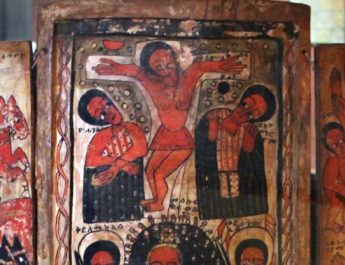Psalm 70
To the leader.A Of David,B for the memorial offering.C
A “leader” = natsach. Properly, something that glitters from a distance. So, something that stands out, excels, has status/standing (such as a chief musician or superintendent of Temple services). This can also mean to be permanent or enduring.
B “David” = David. From the same as dod (beloved, love, uncle); the root may mean to boil, which is used figuratively to describe love. So, this implies someone you love such as a friend, a lover, or a close family member like an uncle. David’s name likely means something like “beloved one.”
C “memorial offering” = zakar. This is to remember, to mark something so that it can be recalled, to be mindful of, to mention.
1 Be pleased, O God,D to deliverE me.
O Lord,F make hasteG to helpH me!
D “God” = Elohim.
E “deliver” = natsal. This is to snatch someone or something away in a good sense – as rescue, defend, or deliver – or in a bad sense – as strip or plunder.
F “Lord” = YHVH. From havah (to be, become) or hayah (to come to pass, become, be). This is the name of the God of Israel, the self-existent and eternal one, the tetragrammaton. This pronunciation has been lost to time so “Lord” is generally used in its place.
G “make haste” = chush. This is to hurry, be eager.
H “help” = ezrah. From ezer (help, aid, helper); from azar (to help, protect, support, ally; properly, to surround so as to provide aid). This is help, helper, support.
2 Let those be put to shameI and confusionJ
who seekK my life.L
I “be put to shame” = bosh. Properly, this means to be pale, which implies shame, disappointment, or confusion.
J “confusion” = chapher. 17x in OT. Perhaps from the same as chaphar (properly to pry into; to dig search for, sink, or explore). This is to be ashamed, disgraced, embarrassed, confounded – to blush.
K “seek” = baqash. This is to seek, ask, desire, or request. It can be any kind of searching. It can also mean to worship or pray – implies a striving for.
L “life” = nephesh. Related to naphash (to refresh or be refreshed). This is soul, self, person, emotion. It is a breathing creature. Can also refer to appetites and desires.
Let those be turnedM back and brought to dishonorN
who desireO to hurtP me.
M “turned” = sug. 14x in OT. This is to turn back, aside, or away. Properly, it means to flinch, which implies moving away or going back. Literally it can mean retreat or figuratively it can mean backslide i.e. apostatize.
N “brought to dishonor” = kalam. This is bearing shame, bringing dishonor or disgrace, humiliate insult, taunt, embarrass, reproach. Properly, to wound in a figurative sense.
O “desire” = chaphets. 11x in OT. From chaphets (properly, inclined towards or bending to; figuratively, to desire, delight in, or be pleased with). This is to delight in, desire, or show favor.
P “hurt” = ra’. From ra’a’ (to be evil, bad, afflict; properly, to spoil – to destroy by breaking into pieces; figuratively, to cause something to be worthless; this is bad in a physical, social, or moral sense; that which displeases, to do harm or mischief, to punish or vex). This is bad, disagreeable, that which causes pain, misery, something having little or no value, something that is ethically bad, wicked, injury, calamity. This refers to anything that is not what it ought to be – a natural disaster, a disfigurement, an injury, a sin.
3 Let those who say, “Aha,Q Aha!”
turn backR because ofS their shame.T
Q “aha” = heach. 12x in OT. Perhaps from he (behold, now) + ach (ah, oh, alas; used for grief or surprise); {from ahahh (alas, oh; exclamation of pain)}. This is ah, ha, or aha.
R “turn back” = shub. To turn back, return, turn away – literally or figuratively. Doesn’t necessarily imply going back to where you started from. This is also the root verb for the Hebrew word for repentance “teshubah.”
S “because of” = al + eqeb. Eqeb is 15x in OT. Perhaps from aqab (to assail, supplant, overreach, follow or grab someone’s heel, to trip someone up); perhaps from aqeb (heel, hind part, hoof, rear guard of an army, one who lies in wait, usurper). This is a heel as the final part of something i.e. the result, consequence, or reward. It can also be used as an adverb to mean as ever.
T “shame” = bosheth. Related to “be put to shame” in v2. From bosh (see note I above). This is shame as a feeling and a thing that creates shame. It can also mean humiliation, confusion, or be used specifically for an idol.
4 Let all who seek you
rejoiceU and be gladV in you.
Let those who loveW your salvationX
say evermore,Y “God is great!”Z
U “rejoice” = sus. Root may mean to skip as in jump for joy. This is a crane or a swift bird. It is also a horse as leaping.
V “be glad” = samach. This is to rejoice or be glad. Properly, it is to brighten up in a literal or figurative sense.
W “love” = aheb. This is to love, beloved, friend. It is to have affection for sexually or otherwise.
X “salvation” = yeshuah. From yasha (to deliver, defend, help, preserve, rescue, be safe. Properly, to be open, wide or free, which implies being safe. Used causatively, it means to free). This is salvation, deliverance, health, victory, prosperity.
Y “evermore” = tamid. May come from a word that means to stretch. This word means an indefinite period of time. So, it could be regular or daily. It could also be constantly, continually, always, or perpetually.
Z “is great” = gadal. This is to grow up, become great, become wealthy – to advance. The root meaning may be to twist in the sense of the process of growing.
5 But I am poorAA and needy;BB
hasten to me, O God!
You are my helpCC and my deliverer;DD
O Lord, do not delay!EE
AA “but I am poor” = ani + ani. Literally in Hebrew “wa’ani ani.” This first ani is I or myself. The second ani is from anah (to be bowed down; humility or being browbeaten, oppressed, afflicted, or depressed; literal or figurative – depressed in mood or circumstance). This is humble, lowly, poor, or afflicted.
BB “needy” = ebyon. From abah (to consent, obey, want, yield, accept). This is needy, poor, beggar. Someone who is wanting.
CC “help” = ezer. Related to “help” in v1. See note H above.
DD “deliverer” = palat. This is to escape, slip out, deliver, carry away, or calve.
EE “do…delay” = achar. 17x in OT. This is to remain behind, linger, continue, be behind, or delay. It can also imply procrastination.
Image credit: “May Showers” in Montebello Park in St. Catherines, Canada by Michael Pardo, 2015.




